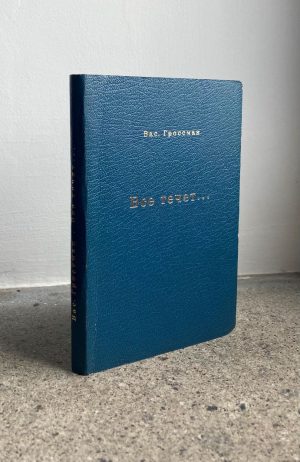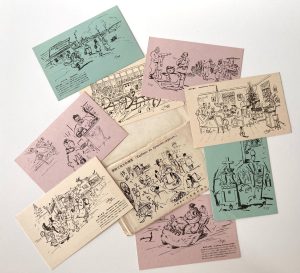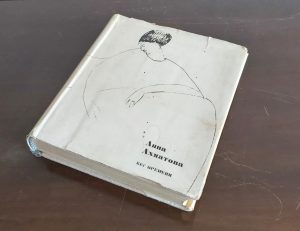Our Notes & References
First edition of Nabokov’s second novel, “the most ‘non-Russian’ of [his] Russian-language works” (Babikov, our translation here and below).
“Of all my novels this bright brute is the gayest. Expatriation, destitution, nostalgia had no effect on its elaborate and rapturous composition”, Nabokov wrote in his foreword to the 1968 English translation of ‘King, Queen, Knave’.
The idea of the novel emerged in the summer of 1927, when the writer was at a resort on the shores of the Pomeranian Bay together with his wife and two Berlin pupils. By the time of the novel’s publication the following year, Nabokov had been living in exile in Berlin for around six years, but still “spoke no German, had no German friends, had not read a single German novel either in original, or in translation” (Nabokov). The novel reflects this alienation and reveals a somewhat hostile attitude towards its main characters, a young German man Franz, his uncle Dreyer and Dreyer’s wife Martha who starts a love affair with Franz and plots with him to kill her husband.
“Despite the fact that the plot is based on a trivial adulterous affair borrowed from pulp fiction, the artistic originality of the novel is [indisputable]. The author masterfully balances between the banality of the literary clichés and witty parody. At first glance, he seriously follows the clichéd scheme, but at the same time he “dismisses” it, parodies it, sometimes turning it inside out” (Melnikov).
The novel proved to be very successful despite mixed reviews from the Russian diaspora. The German translation followed shortly, for which Nabokov received “probably the largest royalties for the entire Russian-speaking period of his work […]. In commercial terms, ‘King, Queen, Knave’ can be considered Sirin’s most fortunate project, originally designed for success among the mass, primarily foreign, readers” (Babikov). Indeed, by the end of the 1920s the Russian book market, “which had swelled during the years of inflation in Germany, gradually shrunk due to the impoverishment of emigration […]. Only those writers who were translated into foreign languages and who were successful in their translations could make a living” (Struve, quoted by Babikov).
The payment for this work allowed Nabokov and his wife Vera to clear their debts and to take their first butterfly expedition in the Pyrenees.
Provenance
M. Durdin (?, pencil inscription to last leaf of text).
Bibliography
Juliar A9.1; Babikov, A. “Klassik bez retushi”, intr. to Korol, dama, valet by Vladimir Nabokov, Izdatelstvo AST, 2021; Melnikov, N. “Vladimir Nabokov. ‘Korol, dama, valet'”// TamIzdat: 100 izbrannykh knig. OLMA, 2014.
Physical Description
Octavo (21 x 14.5 cm). 260 pp. incl. first blank and title, IV pp. ads.
Binding
Publisher’s printed wrappers.
Condition
Wrappers a bit soiled and stained, with minor skilful restoration, neatly recased; the odd spot, a few minor marginal closed tears repaired with japan paper, publisher’s catalogue at end unopened.

![Image for V. SIRIN [NABOKOV]. Korol, Dama, Valet. First edition, Berlin, 1928. #2](https://www.pyrarebooks.com/wp-content/uploads/2024/04/2648_1.jpg)
![Image for V. SIRIN [NABOKOV]. Korol, Dama, Valet. First edition, Berlin, 1928. #3](https://www.pyrarebooks.com/wp-content/uploads/2024/04/2648_2.jpg)
![Image for V. SIRIN [NABOKOV]. Korol, Dama, Valet. First edition, Berlin, 1928. #4](https://www.pyrarebooks.com/wp-content/uploads/2024/04/2648_3.jpg)
![Image for V. SIRIN [NABOKOV]. Korol, Dama, Valet. First edition, Berlin, 1928. #5](https://www.pyrarebooks.com/wp-content/uploads/2024/04/2648_4.jpg)
![Image for V. SIRIN [NABOKOV]. Korol, Dama, Valet. First edition, Berlin, 1928. #6](https://www.pyrarebooks.com/wp-content/uploads/2024/04/2648_5.jpg)
![Image for V. SIRIN [NABOKOV]. Korol, Dama, Valet. First edition, Berlin, 1928. #7](https://www.pyrarebooks.com/wp-content/uploads/2024/04/2648_6.jpg)
![Image for V. SIRIN [NABOKOV]. Korol, Dama, Valet. First edition, Berlin, 1928. #2](https://www.pyrarebooks.com/wp-content/uploads/2024/04/2648_1-300x300.jpg)
![Image for V. SIRIN [NABOKOV]. Korol, Dama, Valet. First edition, Berlin, 1928. #3](https://www.pyrarebooks.com/wp-content/uploads/2024/04/2648_2-300x400.jpg)
![Image for V. SIRIN [NABOKOV]. Korol, Dama, Valet. First edition, Berlin, 1928. #4](https://www.pyrarebooks.com/wp-content/uploads/2024/04/2648_3-300x400.jpg)
![Image for V. SIRIN [NABOKOV]. Korol, Dama, Valet. First edition, Berlin, 1928. #5](https://www.pyrarebooks.com/wp-content/uploads/2024/04/2648_4-300x225.jpg)
![Image for V. SIRIN [NABOKOV]. Korol, Dama, Valet. First edition, Berlin, 1928. #6](https://www.pyrarebooks.com/wp-content/uploads/2024/04/2648_5-300x225.jpg)
![Image for V. SIRIN [NABOKOV]. Korol, Dama, Valet. First edition, Berlin, 1928. #7](https://www.pyrarebooks.com/wp-content/uploads/2024/04/2648_6-300x234.jpg)


![Image for Akhmatova, Brodsky and others, Important poems and other texts, incl. Poem bez geroia [Poem Without a Hero], first editions. #1](https://www.pyrarebooks.com/wp-content/uploads/2023/03/1354-300x260.jpg)
